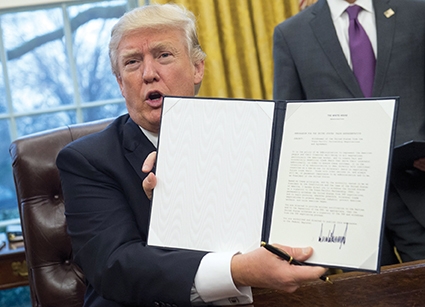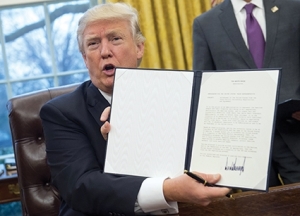Gov’t Professor Says Congress Will Push Back
We spoke to James Thurber, Professor of Government and Founder of the Center for Congressional and Presidential Studies at American University.
Historically, how does President Trump compare to other new presidents?
There is criticism of some of his executive orders because they have not been vetted or evaluated. Most presidents, before they make an executive order, have agencies, departments, and numerous lawyers look over it. President Trump’s executive orders are more aspirational, sometimes ideological; they have been challenged in the courts and that will continue.
Do you expect the US court rooms to turn into battlegrounds between the administration and the judiciary?
Many people are worried about President Trump going too far. The judge in Seattle, appointed by Republican President George W. Bush, declared that his executive order, with respect to designated citizens from seven countries, was against the law. I think we will see many more cases like this.
We have independent and honest judges, we have the FBI investigating, we have inspector generals in every department, and we have prosecutors that have been appointed by Republicans and Democrats: they will go after the people who break the law. We also have a bureaucratic system that believes in the US Constitution, believes in the rule of law, and these people will stand up and defend it.
Is President Trump demonstrating unilateralism in his decisions?
He is in certain cases. Mr. Obama did also, and that was very controversial. President Obama did it because he had a divided party government [where] he could not get policies done, though it was still not right. We have a separated system, where laws must be passed and money appropriated and authorized from Congress. What [Obama] did is to set up a situation where the next presidents feel they can do the same.
Now we have a unified party government with a Republican president and Republican majority in Congress. In cases of a unified party government, frequently, Congress will give the president a little bit of leeway. But if a party leadership is bombarded with random executive orders [that haven’t been cleared with them], they [won’t be] happy and they will push back.
Unlike President Trump, President Obama, after two years, did not have a Democratic majority in house or senate. How do you see the Republican congress responding to the President’s controversial decisions?
There are two kinds of constituencies. [For the] constituency that elected him, these executive orders are attempting to follow up on what he promised to do- to build the wall, to keep “bad people” out of the United States, to get rid of regulations, to change Obamacare. He promised all of these things and now he is doing them. His constituency generally likes that.
The other constituency is the constituency he keeps attacking: the Republican leadership and Republicans in Washington, D.C. He, in the campaign, was someone bizarre and random, and many people in Washington believe he is bizarre and random with respect to his executive orders.
Is it unusual for an American president to compare the moral standards of the country he leads with another country—Russia?
This president has criticized every regime that he talked to- Australia, Germany, the UK, all except for Russia, and except for Mr. Putin. He seems to like Mr. Putin. Everyone in America thinks this is strange. We have been in a situation in America where we try to expand support of human rights, freedom of the press, democracy. Sometimes it works, sometimes it fails. But now, when we have this president, it is very hard to go to a place like Russia and talk about deliberation of separation of power or forms of democracy, when he is ignoring it in various executive actions. People wanted change out of this election, they wanted someone who would move fast. He is doing that, but he is moving too fast.
Nana Sajaia, VOA Georgian Service












